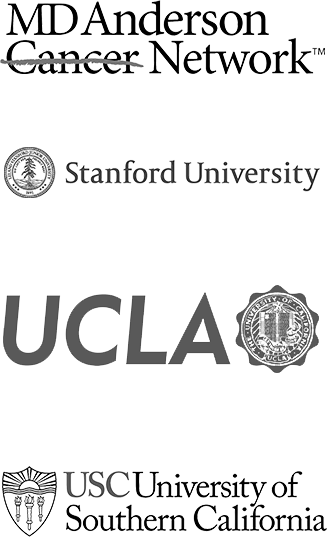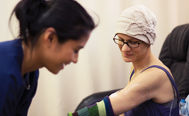Surgery
About Surgery
 Rather than a singular treatment, surgery is now frequently accompanied by a series of chemotherapy and/or radiation as part of a multi-modal treatment plan. Chemotherapy can be used as a pre-surgical strategy for its benefit in reducing tumor size, which subsequently makes the procedure less invasive and extensive in scope for a patient. Surgery’s goal is removal of the tumor plus some of the surrounding tissue as determined by a tumor’s type, location and aggressiveness. Medical research and technology have sufficiently advanced to reduce amputations, which are now a very rare occurrence.
Rather than a singular treatment, surgery is now frequently accompanied by a series of chemotherapy and/or radiation as part of a multi-modal treatment plan. Chemotherapy can be used as a pre-surgical strategy for its benefit in reducing tumor size, which subsequently makes the procedure less invasive and extensive in scope for a patient. Surgery’s goal is removal of the tumor plus some of the surrounding tissue as determined by a tumor’s type, location and aggressiveness. Medical research and technology have sufficiently advanced to reduce amputations, which are now a very rare occurrence.
Conservative Multi-modal Approach
Surgery is the oldest form of cancer treatment but significant advances in surgical procedures have changed how this treatment is executed. Minimally invasive and robotic are the two types of surgery commonly used to treat cancer; cancer type determines which surgical procedure is used:

Minimally Invasive Surgery
This is also called endoscopic surgery and it combines computer imaging and robotics for a less invasive surgical procedure. A long thin tube called an endoscope is inserted through a small incision near the tumor site. At the end of the tube is a camera lens which enables the surgeon to view organs and tissue and perform the operation using special surgical instruments. This technique is less invasive because it does not require the traditional external incision formerly used.
Robotic
In this procedure, a surgeon uses robotic arms controlled from an instrument console. Enlarged, 3-D images of the surgical site are provided through an endoscope inserted through a small incision. Robotic surgery has the added benefit of reducing surgeon fatigue that could occur during a complicated operation. Candidates for robotic surgery are patients undergoing a hysterectomy, prostatectomy, or thoracic procedure.
Patients of minimally invasive procedures commonly experience less blood loss and reduced scarring, and they often have faster recoveries and fewer complications with the ability to go home sooner than with open surgery.
Here is more information on cancer surgery from WebMD.com.
Contact the Cancer Specialists Today
The Los Angeles Cancer Center of Southern California offers patients the best possible solution for cancer recovery while honoring the physical and emotional well being of each patient. We work closely with your surgeons to monitor your progress before and after surgery, and plan the best course of action for chemotherapy and/or drug trials. Please contact our center at 310-552-9999 to schedule a consultation with one of our Los Angeles oncologists to discuss your personal situation and answer your questions.
Read to learn about our second opinion service.



